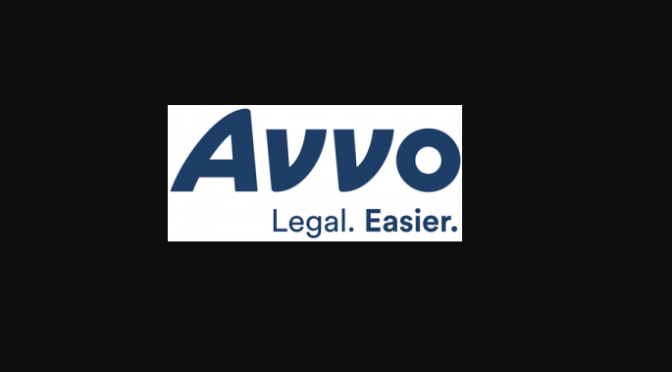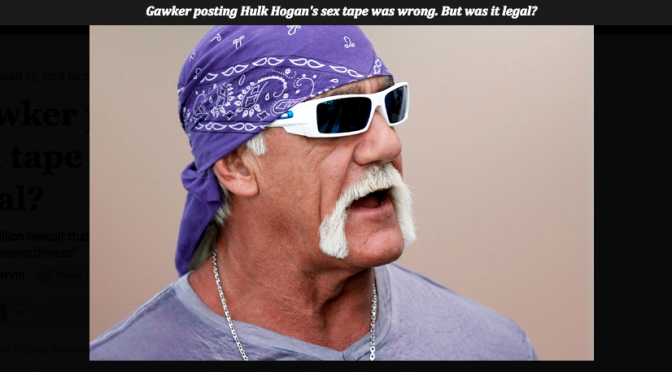A $100 million lawsuit that could bankrupt the media company rests on complicated questions about “newsworthiness”
by DANIEL DENVIR
That Gawker posted a video of Hulk Hogan having sex, a video recorded and distributed without his consent, is unethical. Hogan, legal name Terry G. Bollea, says he was secretly taped, apparently by his friend, while having sex with that friend’s then-wife, at that friend’s invitation. In one light, the story can be read as humorous, because it involves Hulk Hogan and the wife of a man named “Bubba the Love Sponge.” But just think: What if Gawker had posted the nude video creepily taken of ESPN sportscaster Erin Andrews? Oh wait, Deadspin, Gawker’s sister site, did link to the site that posted the video. Clearly, it’s all pretty vile.
Vileness, however, won’t stop some people on the Internet, including some who pretend they are journalists. The key question, then, is whether it was in the legal clear. We’ll find out soon enough: Hogan is currently suing Gawker in a Florida court for a potentially bankrupting $100 million.
Gawker defends posting a portion of the video—above a ruminating think piece about why proles like watching celebrities fuck—because it was newsworthy. How that can possibly be was explained by the post’s author, former Gawker editor A.J. Daulerio, in a videotaped deposition played in court: The only thing that could make a celebrity sex tape non-newsworthy, he snarked, would be if that celebrity was under the age of 4.
Even when the subject of such a video isn’t a celebrity, Daulerio has shown little compunction about publishing. To wit: When Gawker posted a video of a young woman’s bathroom stall sexual encounter several years ago, the woman emailed Daulerio begging that it be taken down, and suggested that she might have been raped. Daulerio responded by refusing to take it down, though the site changed its mind soon thereafter.
“I’m sure it’s embarrassing but keep your head up, these things pass,” he reportedly emailed.
If I prized schadenfreude, I might pray that someone riding so high on ethics-free hubris might one day face a karmic sally of Internet-breaking public humiliation, one laying him so low that any would-be trolls thinking about following in his footsteps would be deterred from doing so forever after.
Such a wish, however, would be unkind. More to the point, it’s way beyond my technological prowess to effectuate. So, instead, I decided to dig into the the legal questions at hand.
The lawsuit was filed in a state court, so it won’t set any larger precedent unless it is ultimately appealed to the U.S. Supreme Court. But it nonetheless concerns a question deemed of incredible importance: Is Gawker protected by First Amendment free press rights? Or, in an age rife with Internet-based harassment and revenge porn, does Hogan’s right to privacy win out? There’s not a lot of precedent here, so courts around the country will be looking to how the Florida lawsuit plays out.
Of the four experts I contacted, only one, Santa Clara University School of Law professor Eric Goldman, said that Gawker’s actions might be protected by the First Amendment because of Hogan’s previous statements — that he had not had sex with that woman — and the fact that he is a celebrity.
“Change virtually any fact and the legal analysis would look very different,” emails Goldman. “If Bollea hadn’t made the false public statements, the newsworthiness of the video would decrease; and if Bollea wasn’t a high-profile celebrity, there usually would be little or no newsworthiness to the video footage.”
Three other legal scholars told me that Gawker was in the wrong, albeit for different reasons.
Amy Gajda, a law professor at Tulane and the author of “The First Amendment Bubble: How Privacy and Paparazzi Threaten a Free Press,” says that existing laws allowing people to bring suit for invasion of privacy suffice.
“There is enough space in First Amendment law to suggest that Gawker cannot do this,” says Gajda. “If private information is revealed…like nudity, sex information, medical information, then that revelation of information can be punished despite the First Amendment as long as the information is not newsworthy or not in the public interest.”
Read Full Article – http://www.salon.com/2016/03/13/gawker_posting_hulk_hogans_sex_tape_was_wrong_but_was_it_legal/




